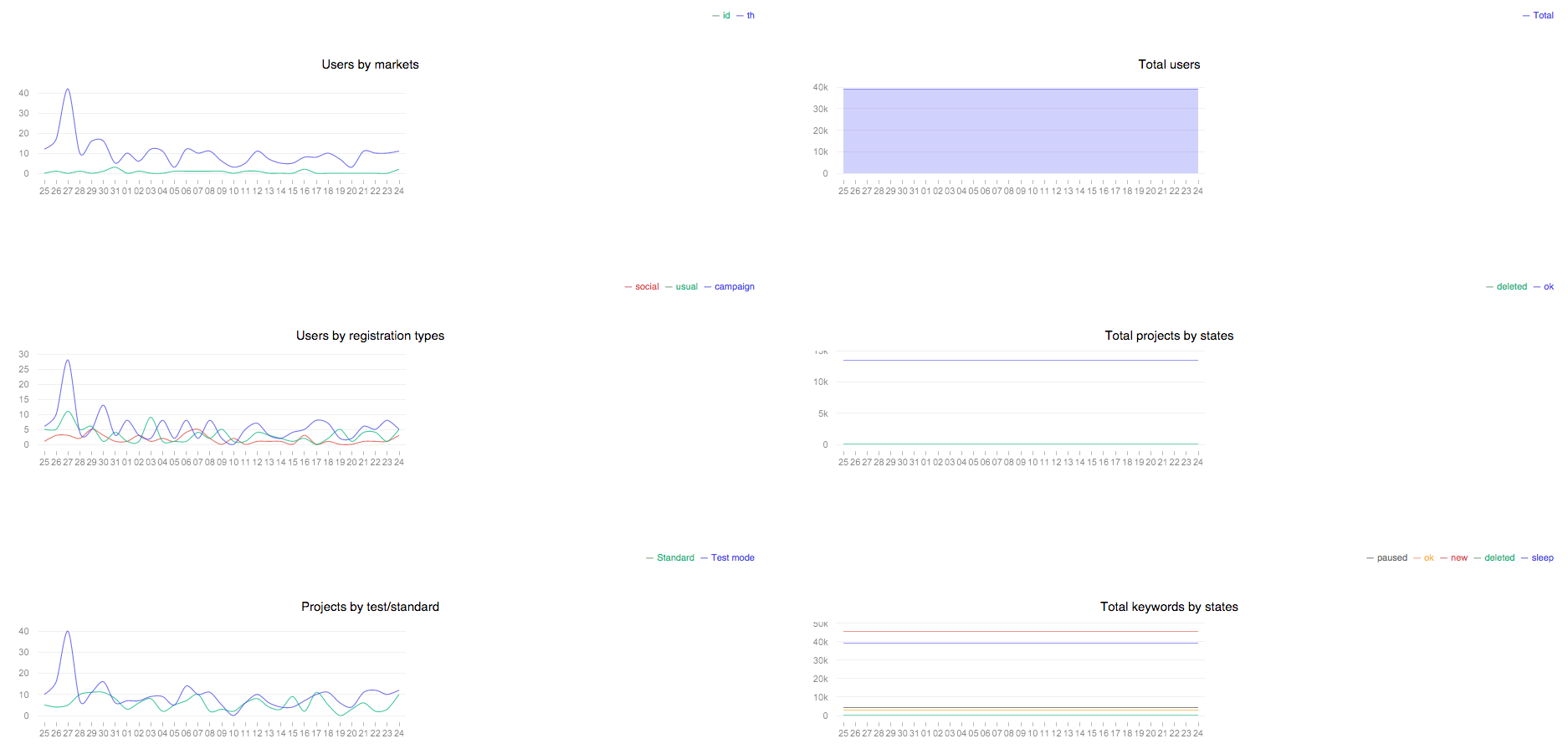https://github.com/accessd/models_stats
Charts for your rails models with MetricsGraphics.js and NVD3
https://github.com/accessd/models_stats
activerecord collect-statistics graphics metricsgraphics nvd3 rails ruby statistics
Last synced: 10 months ago
JSON representation
Charts for your rails models with MetricsGraphics.js and NVD3
- Host: GitHub
- URL: https://github.com/accessd/models_stats
- Owner: accessd
- License: mit
- Created: 2014-11-24T19:06:40.000Z (about 11 years ago)
- Default Branch: master
- Last Pushed: 2015-01-09T10:39:16.000Z (about 11 years ago)
- Last Synced: 2025-04-26T13:41:58.675Z (10 months ago)
- Topics: activerecord, collect-statistics, graphics, metricsgraphics, nvd3, rails, ruby, statistics
- Language: Ruby
- Homepage:
- Size: 760 KB
- Stars: 42
- Watchers: 6
- Forks: 2
- Open Issues: 2
-
Metadata Files:
- Readme: README.md
- License: LICENSE.txt
Awesome Lists containing this project
README
# ModelsStats
Graphics for your rails models. It may show count(or average, or sum, or another sql agregate function) of models for each day with grouping, conditions.
For graphics it uses for your choice [MetricsGraphics.js](https://github.com/mozilla/metrics-graphics) or/and [NVD3](http://nvd3.org/).
Dependencies: [Redis](http://redis.io/) for store statistics.
[D3](http://d3js.org/), [jQuery](http://jquery.com/), [Bootstrap](http://getbootstrap.com/) it's dependencies of MetricsGraphics.js.
Preview:
NVD3:


MetricsGraphics.js

## Installation
Add this line to your application's Gemfile:
```ruby
gem 'models_stats', github: 'accessd/models_stats'
```
And then execute:
$ bundle
In your application.js manifest:
//= require models_stats/nvd3
or/and
//= require models_stats/metrics_graphics
if you want use MetricsGraphics.
In your application.css.scss manifest:
//= require models_stats/nvd3
or/and
//= require models_stats/metrics_graphics
if you want use MetricsGraphics.
Also if you use MetricsGraphics.js you must have [jQuery](http://jquery.com/) and [Bootstrap](http://getbootstrap.com/) js/css included.
## Usage
### Configuration
Add config file `config/models_stats.yml`, for example:
minimal configuration:
```yaml
---
- total_users:
description: "Total users"
model: User
```
it would be calculate total users for day.
Enhanced configuration:
```yaml
---
- total_links_by_error_types: # Statistics alias, must be uniq
description: "Total links by error types"
model: Link
datetime_attr: :created_at # Date or datetime attribute, allows to calculate the count of models per day
group_by: :error_type_id
conditions: "error_type_id != <%= Link::NO_ERROR %>"
group_by_values_map: <%= ModelsStats.convert_hash_to_yaml(Link::ERROR_NAMES) %> # for example maping integer field to text representation
graph_width: 430
graph_height: 140
graphic_lib: nvd3 # By default, or can be metrics_graphics
graphic_type: stacked # It's can be using with nvd3, by default line
date_tick: day # By default, or can be month or week
date_format: '%d/%m' # By default is %x, more information about formattting time available at https://github.com/mbostock/d3/wiki/Time-Formatting
- average_by_keyword_positions:
description: "Average by keyword positions"
select_statement: "AVG(google_position) AS count" # Right here you may specify select query, `count` alias for function required
model: KeywordPosition
```
If you want using specific redis for store statistics, set it in `config/initializers/models_stats.rb`, for example:
ModelsStats.redis_connection = Redis.new(host: '127.0.0.1', port: 6379, db: 5)
Default graphics library can be configured through:
ModelsStats.default_lib_for_graphics = :nvd3 # Or metrics_graphics
Default graphics type:
ModelsStats.default_graphics_type = :line # Or stacked
Default graph width:
ModelsStats.default_graphics_width = 500
Default graph height:
ModelsStats.default_graphics_height = 120
Default date tick:
ModelsStats.default_date_tick = :day # Or month, week
Default date format:
ModelsStats.default_date_format = '%d/%m'
For the full list of directives for formatting time, refer to [this list](https://github.com/mbostock/d3/wiki/Time-Formatting)
### Collecting statistics
Add to your crontab(may use [whenever](https://github.com/javan/whenever)) rake task `models_stats:collect_stat_for_yesterday`, run it at 00:00 or later and it will collect statistics for yesterday.
For collecting statistics for last month run rake task `models_stats:collect_stat_for_last_month`.
Also you may collect statistics for specific date and config, for example:
```ruby
date = 2.days.ago.to_date
statistics_alias = 'total_links_by_error_types' # statistic alias which you define in `config/models_stats.yml`
ModelsStats::StatisticsCollector.new.collect(statistics_alias, date) # By default date is yestarday
```
### Clear statistics
You may clear statistics data for particular alias.
```ruby
c = ModelsStats::StatisticsCollector.new
c.clear_all_data('total_links_by_error_types')
```
### Display graphics
In your views use helpers:
Render single graphic for total_links_by_error_types statistic alias(which you define in `config/models_stats.yml`) and last week:
= render_models_stats_graph('total_links_by_error_types', 1.week, 800, 200) # By default period is 1.month
With two last parameters you can customize width and height of the chart. In this case it will be 800px and 200px.
Render all defined graphics splited by two columns - first for new models count, second for total models count
= render_models_stats_dashboard
## Contributing
1. Fork it ( https://github.com/accessd/models_stats/fork )
2. Create your feature branch (`git checkout -b my-new-feature`)
3. Commit your changes (`git commit -am 'Add some feature'`)
4. Push to the branch (`git push origin my-new-feature`)
5. Create a new Pull Request